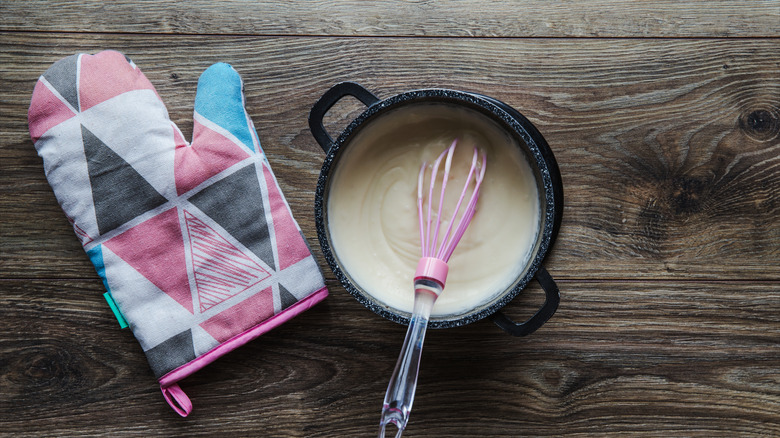Alex Guarnaschelli's Simple Tip For Fixing A Broken Sauce
Hitting a snag when you make a sauce is almost a given. It happens to even the best cooks. Too thick. Too thin. Too lumpy or grainy. Too sweet, not sweet enough. The list of potential pitfall reads like a child's fairy tale. But what can you do when your sauce "breaks?" According to the Blue Apron blog, a broken sauce is the result of an emulsion separating — think Hollandaise, a béarnaise, or even a chocolate sauce. So, instead of an emulsion with a smooth consistency, you end up with a sauce where the liquid and fat have separated, which is neither pretty nor appetizing.
But never fear, Alex Guarnaschelli, celebrity chef and judge on Food Network's food competition show "Chopped" can help save your broken sauce. Guaranschelli shared with People that a broken sauce is not the end of the world, and it's actually pretty easy to fix if you know what you 're doing. How do you know if your sauce is broken or even just flirting with the idea? Blue Apron explains that if you see "little fat droplets" around the outer perimeter of your sauce, it is probably about to break. However, if it is broken, it will look like you have two sauces in your pan. So, what does Guarnaschelli suggest when this culinary nuisance happens?
Warm water is the glue for a broken sauce
Alex Guarnaschelli shared that, while your first instinct may be to add more fat to a sauce that is broken or breaking, don't. The "Supermarket Stakeout" host told People that, if you have a chocolate or cream sauce that has "separated or become grainy," skip the butter and cream. Guarnaschelli said, "My mom always added more cream or butter, but it didn't work." Instead, she suggests, "The easiest fix is to balance the excess of fatty ingredients: Just stir in a few spoonfuls of warm water."
Blue Apron concurs that if you use a couple of teaspoons of whatever your "base" liquid for your sauce happens to be and whisk with a little elbow grease, the sauce should firm up again. They also remind sauce makers that low and slow are your besties when making sauces, so make certain your heat isn't too high as that is a sure catalyst for separation. They also warn that if a sauce that has been completed sits and cools off too quickly, it may show signs of breaking. If this happens, just slowly reheat and stir, This will renew your sauce's vitality and bring it back together.

